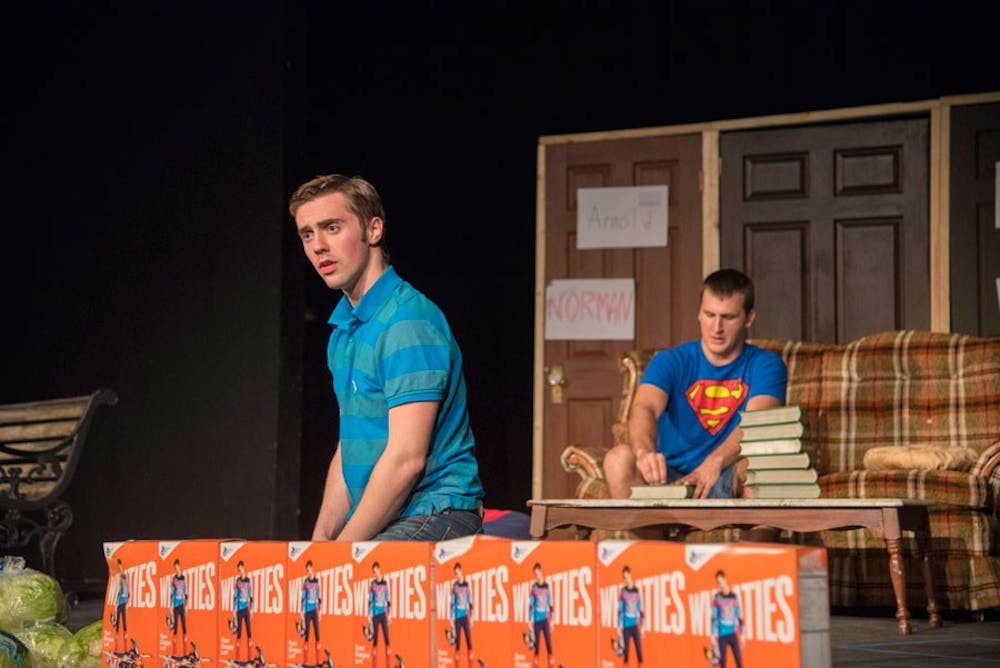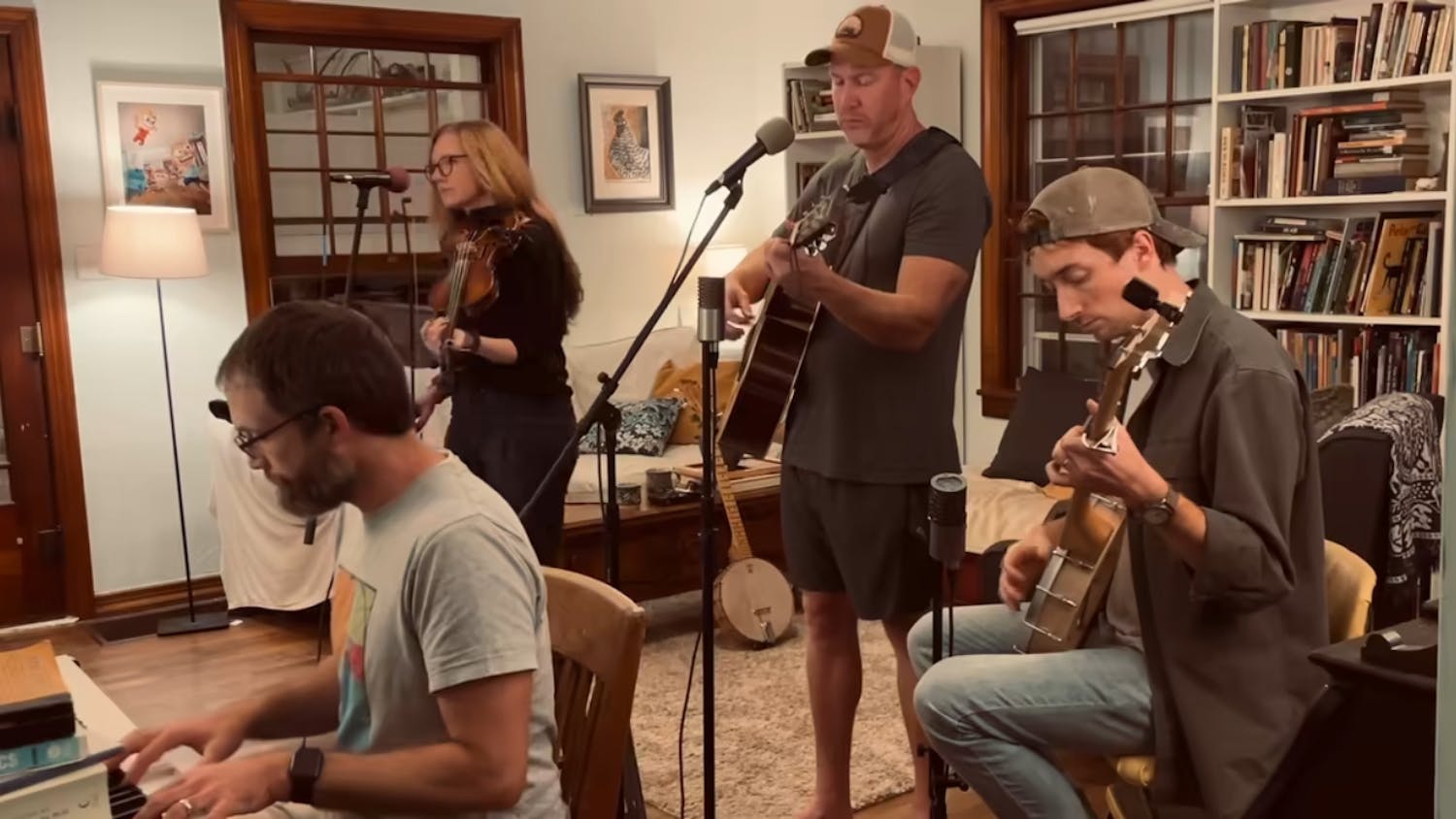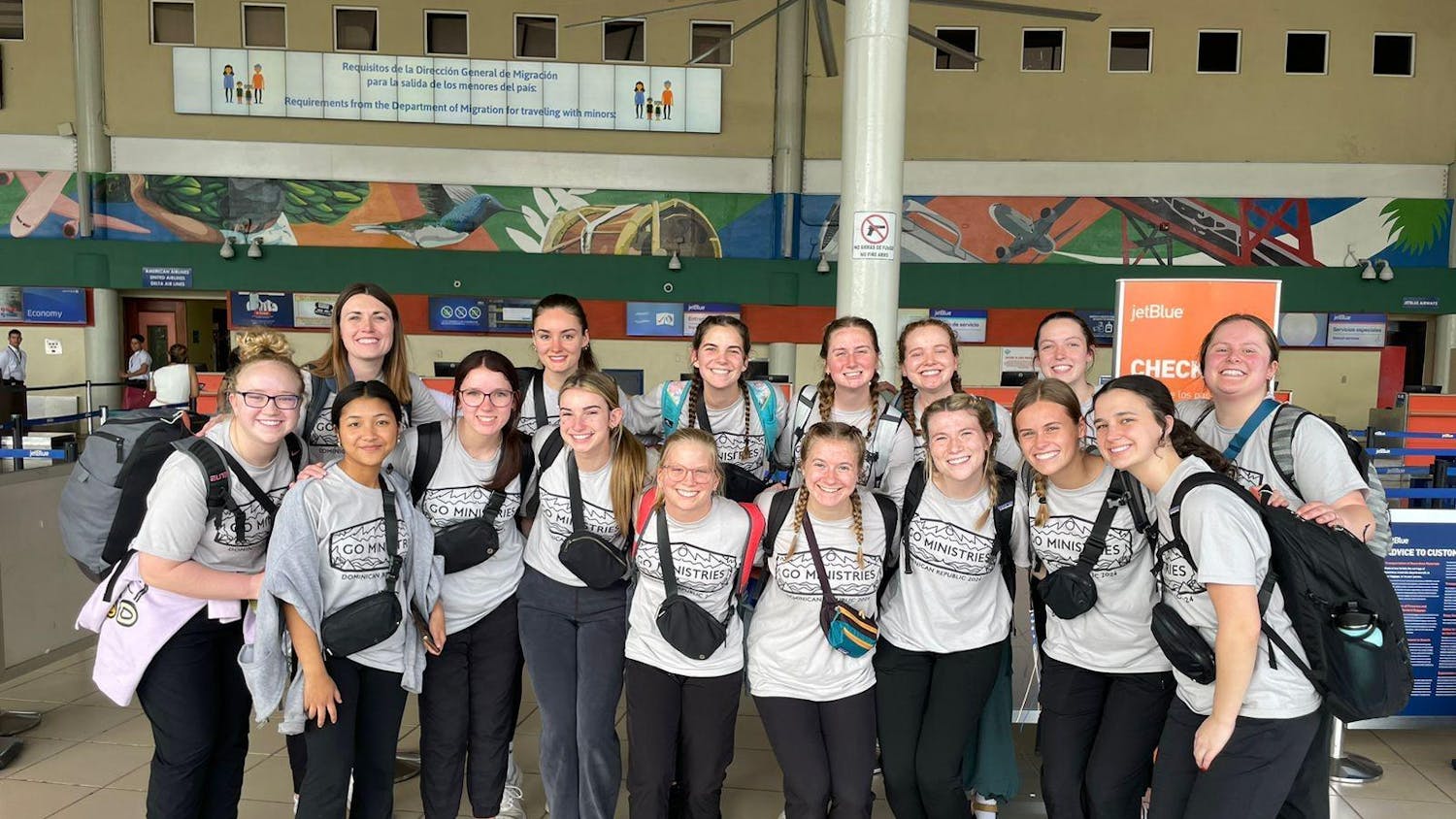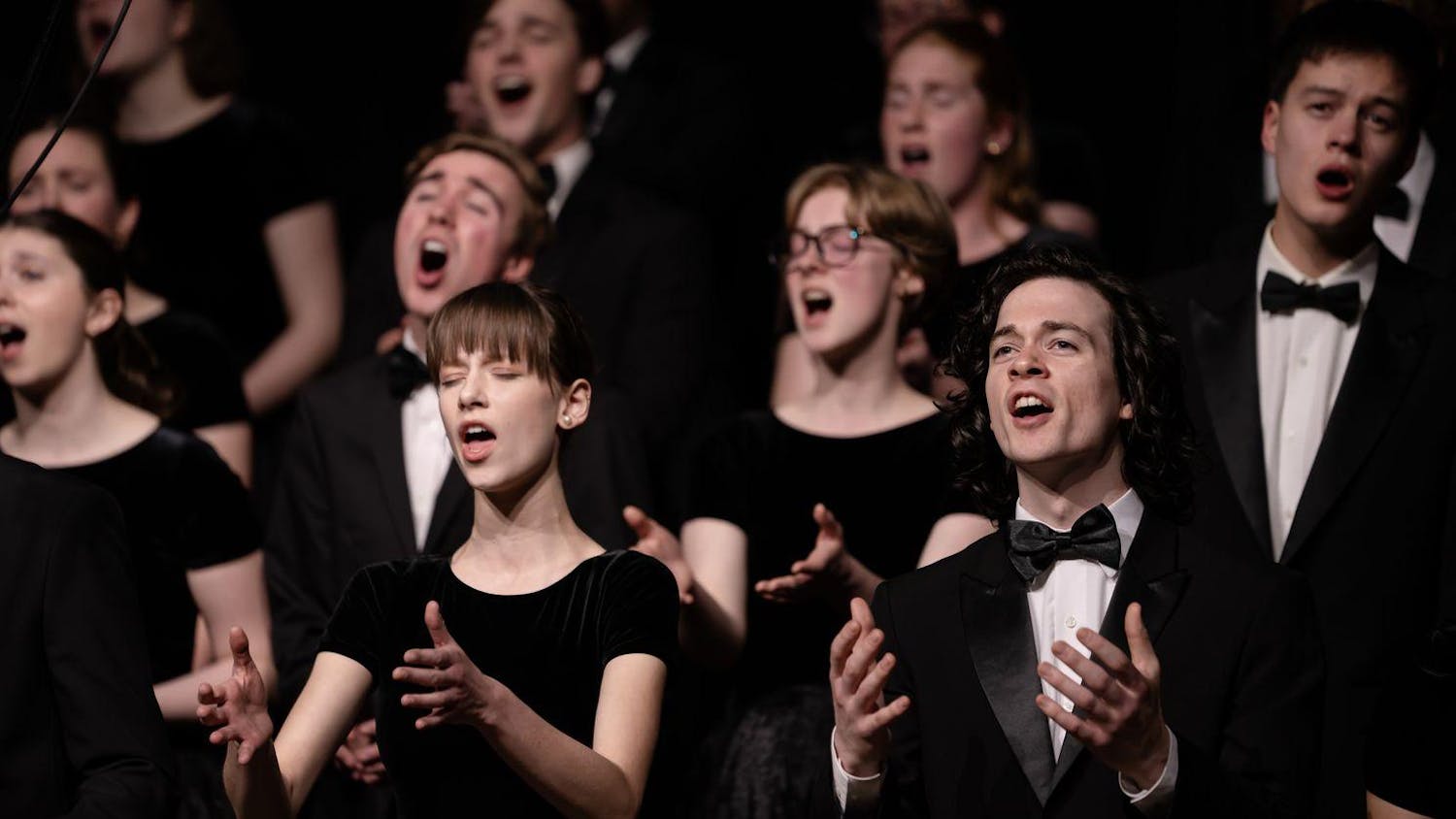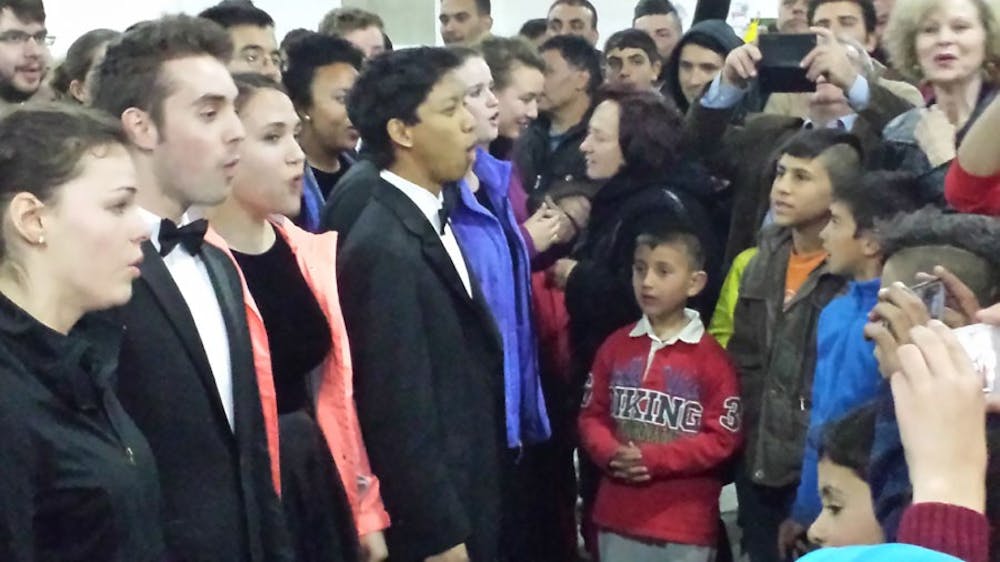
By Austin Lindner | Echo
A shimmer of exhaust from the tour bus rose into the Greek night sky as 47 Taylor students piled into their vehicle.
After finding their seats, the Taylor Concert Chorale quickly swapped shiny black concert shoes for worn sneakers or flats, in comical contrast with their crisp tuxedos and black dresses.
Most nights, the inside of the bus was filled with the sounds of conversation and laughter bouncing between the aisles. Tonight, however, there was tension-just the buzz of voices hushed in anticipation.
Only minutes before, the students had performed before an audience of a few hundred at the City Music School in the city of Drama during their spring break trip to Greece, singing a variety of sacred and secular pieces.
Every four years, Chorale travels to a foreign country with the goal of spreading love and the gospel through the language of music. For the past few years, JoAnn Rediger, director of Chorale and Taylor Sounds, has been working to get the chorale to tour Greece, a country it has visited twice in previous years.
The first two days involved touring ancient ruins during the day and performing their 90 minute program at night, before returning to the hotel and packing up for the next morning. This evening, however, the chorale was making a quick stop before proceeding to the next destination.
Just hours before, the chorale was informed that they had been given a last-minuteopportunity to visit a Syrian refugee camp near the concert venue. They planned to enter, perform a couple of songs from their set list for the refugees and exit. Now, sitting on the bus for this short ride, the students were trying to mentally prepare themselves.
"When I first heard we were going to visit a refugee camp, I didn't know how to wrap my head around it," said freshman Lindsay Couvion. "Most of the time, I feel very underprepared when it comes to sharing the gospel with strangers, and this to me seemed like the ultimate example of breaking my comfort zone. Singing to mostly Muslim refugees, about Jesus nonetheless? This was going to be difficult."
The rest of the students felt a similar smorgasbord of emotions on their ride to the camp. Some were afraid to say the wrong thing. Others were bracing themselves for an emotional impact. A number of students felt guilty about arriving at the camp in fancy concert attire, not wanting to appear prideful in front of those who may only have one set of clothes.
Noticing the apprehensive atmosphere aboard the bus, Roger Rayburn, one of the tour's chaperones and leaders, stood and encouraged the passengers to use their remaining minutes to pray with the person sitting next to them. The rest of the ride was spent with heads bowed, murmurs of voices blending with the hum of the bus.
"We prayed for humility going in there," said junior Sharee Nurse. "We prayed to not have some weird Savior complex and to just do whatever it was that God wanted us to do."
As the bus pulled through the gates of the camp and parked, silence fell over the students. The only sound from the group as they trudged up to a large warehouse on the other side of the gated area was the crunch of 47 sets of feet on the sandy gravel beneath their sneakers.
"Walking into the camp, I expected it to be very sad, very dismal," said junior Kelli Weaver.
The sight that greeted the chorale when the warehouse doors creaked open surprised everyone. A slow cheer and a scattered round of applause came from the crowd of refugees as the students entered the building.
Adults walked over from worn tents and clotheslines to greet the students, while children scurried up and stared with shy smiles.
"When I walked into the camp, I was overwhelmed by the joy that the refugees expressed at seeing us," said senior Becca Jackson. "It was confounding how the people who had lost so much welcomed us as if we were giving them anything more than a few songs."
As the residents of the warehouse began to gather near the group, the chorale began to sing songs from its repertoire. As they sang, some of the children began to weave their way through the throng of students, grabbing hands and giving hugs.
"We were singing 'Chords of Love,' which is a song that speaks to the idea that we're all connected," Weaver said. "During that song, there was this little girl that held my hand and I sang the song to her, directly into her eyes."
After the songs were finished, the chorale members continued speaking with the Syrian people, shaking hands, giving high-fives and taking pictures. Before long, the group was informed that its 15 minutes were up, and they were ushered to the door.
Some of the refugees followed the chorale members back to the bus, children holding hands and swinging between the students. At the bus, their hands parted.
Climbing one by one into the vehicle, the chorale members sat speechless in the dim lighting. Some students were smiling, overwhelmed with surprise and joy. Others were sobbing, heads pressed to the seats in front of them.
"Leaving was a lot harder than I expected," Nurse said. "I think everyone was at a loss for words, figuring out how to process what we had just seen and experienced. A lot of people were crying, I think just feeling really horrible about their situation. It was hard."
Driving back to the hotel in the silence, the chorale continued to deal with the images still flashing through their heads.
The little boy with the toothy smile and the faded green sweatshirt, arms outstretched, waiting to be picked up by a stranger in a tuxedo.
The dusty living quarters, in a warehouse so large that its other side was out of sight.
The former college student that Nurse had talked to, a young man the same age as the Taylor students, trapped in a situation that could have easily been her own.
The Christian priest Couvion had met, who told her how grateful he was for just 15 minutes of distraction.
"I felt discouraged," freshman Lauren Vock said. "I was frustrated with the fact that I had the opportunity to be with these people and all I could do was sing and quickly say hi. I wanted to find a solution, to fix it."
But the solution was elusive, if not impossible to grasp.
For the remaining six days, the chorale continued trekking through Greece, singing every night and touring notable sites during the day. They had the opportunity to bridge a gap by singing in Catholic, Greek Orthodox and evangelical churches, performing in venues that had been off-limits to evangelical singers in previous years. They followed the footsteps of Paul and the apostles in the ancient ruins of Philippi and Corinth and stood at the sites of the New Testament.
But the students didn't forget the people in the warehouse, behind the gates of the refugee camp.
The memories from those 15 minutes continued to affect the students, begging to be felt, begging for some kind of resolution.
"The whole experience left me wishing I could do more," Couvion said. "Seeing their struggle firsthand really opened my heart to the reality of pain in the world, and I'm still trying to reason out what I should do going forward."

